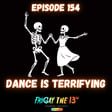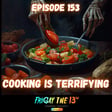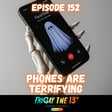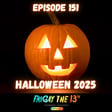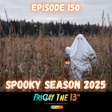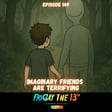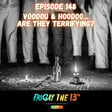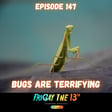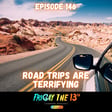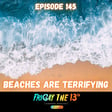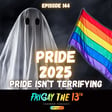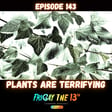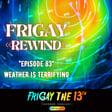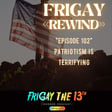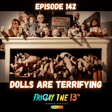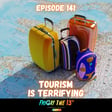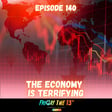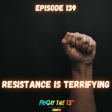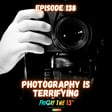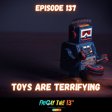Become a Creator today!Start creating today - Share your story with the world!
Start for free
00:00:00
00:00:01

HORROR HOOKUP: Sean Cribbin and Craig Huckerby of WAS I NEXT?
Bruce McArthur, Canada's most notorious serial killer, killed at least eight gay men until his conviction in 2019.
One of his victims, however, escaped his clutches, and lived to tell the tale. In this Horror Hookup we welcome Sean Cribbin, the man who escaped and survived– and is finally ready to tell his story.
Craig Huckerby, director of WAS I NEXT? joins to discuss the making of the documentary.
Transcript
Introduction & Opening Statements
00:00:00
Speaker
proud members of the Dread Podcast Networking. I am the writing on the wall, the whisper in the classroom. I'm Marjorie Greene and I approve this message to save America, stop socialism and stop China.
00:00:28
Speaker
We are real life. Doubters, the doomsters, the gloomsters, they are going to get it wrong. They're not their memories. Where are you gonna go? Where are you gonna run? Where are you gonna hide? Nowhere. Because there's no one like you left. What do we want?
Rallying Cry for Justice
00:00:50
Speaker
Justice! When do we want it? Now! Let's go! What are you waiting for, huh?
00:00:57
Speaker
What are you waiting for?! I want you to know that the movement we started is only just beginning. Sometimes, that is better. ...and cadaver dogs scour the property at a home on... ...the dozens of officers have been working around the park... ...scouring property... Getting guilty to eight counts of murder in the first degree, this makes him Canada's biggest serial killer. This isn't your average documentary. This isn't your average story.
00:01:26
Speaker
He wasn't your average serial killer. I think that that's because he knew what he was doing and he was evil. The most infamous serial killer in the history of
Toronto's Undetected Serial Killer
00:01:37
Speaker
Toronto. I mean, this man was brutal, relentless. He went undetected and he got away with a lot. He deceived a lot of people along the way. And my son isn't your average survivor.
00:01:52
Speaker
Welcome back to another Horror Hookup on Frage the 13th Horror Podcast. My name is Andrew. And I'm Matty. And if you're new to our Horror Hookup series, these are the special episodes where we have conversations with all kinds of people, from directors and writers to even ghost hunters and Sasquatch hunters. Yep, we've had them all. Today we welcome yet another first.
Sean Cribbin's Story Begins
00:02:12
Speaker
Star Sean Cribbin and director Craig Huckabee of the new documentary, Was I Next? The Sean Cribbin Story.
00:02:19
Speaker
After a year and a half of talking online, Sean finally agrees to meet his new friend in person. Little does Sean know that he just hopped in the vehicle of Canadian's... Let me start over. After a year and a half of talking online, Sean finally agrees to meet with his new friend in person. Little does Sean know that he just hopped in the vehicle of Canada's deadliest serial killer. As the day goes on and events ensue, a chance interruption from a roommate forces Sean to dwell on the thought, was I next?
00:02:47
Speaker
Sean, Craig, welcome to the show. Thank you. Thank you. Thank you for having us. Yeah, sure. So pleased to have you both with us. And Sean, our first question is for you.
Atmosphere in the Gay Village
00:02:58
Speaker
You know, for some of our audience that may not be familiar with Toronto, we're wondering what it was like to be in the gay village at that time. You know, was there any paranoia circulating around the missing men to kind of paint the picture for us? What was the neighborhood like?
00:03:16
Speaker
Well, there was knowledge about the missing men. The first three that went missing were, I remember walking down the street with a friend and seeing their missing posters put side by side, all three of them. And there was a similarity between the men. And my friend remarked to me that there was a serial killer. I felt at that time he was overreacting. I was proven wrong. I will admit. And then from there, there was
00:03:47
Speaker
no there was there was an undercurrent of knowledge about more people going missing and it wasn't until the little spree towards the end um went because uh salim went uh in april and then andrew in june on pride day that was the final one sure and uh by then like even before them because i i um
00:04:11
Speaker
I was aware, and I said to MacArthur about there being a serial killer.
Encounter with Bruce McArthur
00:04:19
Speaker
Wow. Yeah. So that leads me to my next question. In the documentary, you finally agreed to meet Bruce, and you even mentioned, like you said, that there was a serial killer in the neighborhood in conversation with him. Just to kind of level set our audience, and you don't have to go into too much detail because it's kind of talked about in the documentary.
00:04:38
Speaker
For those that are not familiar with your story, can you just take us through a little bit of what happened that day in your own words? Okay, so I was hooking up with this man who I talked with for about three years on three different men's apps, like hookup sites, lack of a better name. And then so the day I went, I felt I was meeting someone familiar.
00:05:08
Speaker
I went got in his truck the first thing I did say to him is you hear there's a serial killer in the neighborhood and then I went I wonder who it is and then I went into theories of who I thought it could be
00:05:24
Speaker
just to fill in the space because he was not commenting at the time but it didn't faze me as odd and just you know it was first hookups i was nervous he was i assumed nervous maybe he was just laughing inside wondering what i was saying that um and then so we got back to his place it's about five miles on drive we did small talk i learned that he was almost handsome and stuff and um
00:05:51
Speaker
Then we went upstairs and then I was running a few minutes late to make up time. I decided to go to the bathroom and give him the drug GHB, which was on me. I gave it to him with instructions how to mix it.
Traumatic Events Uncovered
00:06:18
Speaker
And hey Sean, just to interrupt you, just because some of our listeners might not know, can you tell us what GHB is?
00:06:25
Speaker
Well, it's also known as the date rape drug. Gotcha. Okay. And it's one of those things in the rape dosage, it creates a euphoria heightens this sexual experience. In the wrong doses, you pass out. And he gave me a double dose from what I can tell.
00:06:49
Speaker
And I was out within five to 10 minutes, I would say, of getting there. And then he did some stuff while I was unconscious. I don't know if you want me going to detail there. You don't have to. Okay. And then I woke up, but unless you know you were unconscious,
00:07:15
Speaker
Unless someone's there to tell you you passed out, you don't know you passed out. I just thought I missed a blip. Almost like a stutter in time. And none of the things he used or were in the photograph he took while I was unconscious were present, so I never saw them. They didn't come out until after I was unconscious and they went away. The only reason I know they were there is because he did take a photograph while I was unconscious. Oh my gosh.
00:07:44
Speaker
And that was the one with the murder weapon up against my throat and the DNA of the two previous victims on there. My gosh, I'm so sorry. And, and, and just to be clear on that too, for our listeners and like Andrew said, this isn't the documentary, but by, you know, the, the, the, the murderer, he, he took pictures of his victims, correct? Yes. He, um, took all of all of them. He had, uh, post mortem and, uh, pre death shots. Wow. Wow.
00:08:14
Speaker
So going past this horrific night for you, which we know that you're still living with this trauma, and thank you once again for sharing your story and for coming on our show and talking about it with our listeners. But when you heard later on the news breaking about Bruce,
00:08:35
Speaker
I mean, what was that?
Realization & Police Involvement
00:08:36
Speaker
What was that like when you first heard when you saw his picture, when you knew that it was him? What flashed through your head? Well, it was funny because I spent the whole night from the time I heard and found out it was him. Like my first reaction was, oh, my God.
00:08:53
Speaker
I was with him, but then as I sat for the 12 hours that night, and I even asked a couple of friends, should I report it? I don't think anything out of the ordinary happened. It was a bad date, but nothing stuck out in my mind.
00:09:13
Speaker
I finally concluded when I went to sleep that night that if there was anything pertinent, the police would contact me. And that's when the phone rang the next morning. That's what woke me up was the police calling me, telling me that I had vital information for the case. Wow. Now I want to bring Craig into the conversation. Craig is the director of the documentary. How did you get involved with this project and why did you feel it was important for you to help Sean tell his story?
00:09:43
Speaker
Well, I was basically asked by Billy, the producer, he knew Tammy and Tammy and I had worked quite a lot for a while and so Tammy brought me in.
00:10:01
Speaker
And we met with Billy and Billy asked or Billy sold me the story and I wasn't even sure if I could actually do it because I have a full-time job in media and I wasn't sure if I could take that time off.
00:10:18
Speaker
And once he told me about the story, it was like when I work in news media and once he told me the story, it was like, OK, I have to do this. It's a it's a huge story. Right. And so we just made it work. And the reason I wanted to do it is because it was such a fascinating story.
00:10:42
Speaker
And I thought, wow, this is an opportunity I can't turn away. So I said, yeah, let's do it. And, you know, I think part of the part of the compelling nature there, Craig, was
00:10:57
Speaker
I'm wondering if, if you didn't tell the story, if it would have been told. And what I mean by that is in a way that others could actually hear it on a larger, on a scalable basis, right? Because even with the original manhunt and everything going on, I know that the police maybe didn't treat it as well as they could.
00:11:19
Speaker
in Canada and maybe the full story wasn't being allowed to be told out there. So I'm sure for you it had to be important to tell this uniquely LGBT story about these tragic losses of life. Was that a part of it for you?
00:11:40
Speaker
Well, what was really part of it was that Sean had his story that wasn't allowed to come out to the public. And because he, MacArthur pleaded guilty. So there's no case, there's no court dealings or whatever. So this was all bottled inside of him. And sure, you know, this is an opportunity
00:12:04
Speaker
that he could get the history out and tell it his way. And that was really important to me and the rest of the crew was that we didn't want to sensationalize the Bruce McArthur aspect. We wanted to tell Sean's story and the hell he went through.
00:12:24
Speaker
It was very, that was part of the challenging part of it was not sensationalizing because that's all you heard about on the news for a couple of years was Bruce McArthur. And it was very sensationalized story.
00:12:40
Speaker
we didn't want to focus on that. Mind you, we had to at some point, you got to tell that part of the monster. Right. Before you see how it affected Sean. Right.
Relationships & Emotional Challenges
00:12:51
Speaker
So Sean, we know that from talking to him, your producer Billy Greer was a huge part of bringing this team together to tell the story. Tell us a bit about your relationship with Billy and why you chose him to help you bring your story to the screen. Well, Billy, I know from
00:13:08
Speaker
At least 23 years, he used to work with an ex of mine at a bar and he had circumstances in his life that put him in a precarious situation and he became homeless.
00:13:25
Speaker
and this was over the Christmas holidays I remember and I found out through my ex and I said that he should move into our solarium in our house or in our apartment and he did and I didn't even remember this when Billy first approached me he filled me in like he remembered things like
00:13:48
Speaker
I made sure he had a stocking on Christmas morning and presents under the tree and stuff like that. So because of that, I guess outreach or just it didn't seem like a big deal to me to do that. But Billy remembered it and his life went in a trajectory to improve his situation.
00:14:12
Speaker
and to gather more skills that could possibly produce a documentary like this. And when he approached me, I was actually in Portland, Oregon and I was in a hotel and I turned on my Facebook. It was the first time that I turned it on live after being off for over a year.
00:14:34
Speaker
and he messaged me almost immediately and I just happened to respond very casually and then he was right there he was like sitting on it and he was just like then he asked for a phone call and I took a call and we talked for quite a while and it was very emotional at first because
00:14:55
Speaker
we did catch up. And then he had this idea. And I said that when I got back to Toronto, I would definitely meet with him. And I was being approached by some like Universal and NBC and a few other, the EBC was in there. And so when I just, Billy was just so passionate about the project and making sure that I was safe and treated well.
00:15:22
Speaker
It was a no brainer in the end, like that I would go with him over the others. Yeah. Now speaking of that, Craig, you know, knowing that this was going to be such an emotional ride, um, what, you know, you even in the documentary revisit the site of kind of the incident. Um, what precautions did you take when filming these scenes? How do you mean? Like with Sean? I mean, did you, how did you guys have a lot of conversations about what was going to be happening? And I mean, really like, like, like emotional, emotional precautions.
00:15:51
Speaker
Well, very much for Sean. This was all new to me, right? I mean, they were taking me to the locations of where they met and his apartment. So I didn't feel emotional about it, but I could understand Sean feeling emotional because this was the first time he went back there.
00:16:11
Speaker
And, you know, I remember shooting it at the apartment. I'm thinking, jeez, I wonder what Sean is feeling right now. And, you know, obviously he was emotional about it. Yeah, that was shooting commenced on the two year anniversary of that actual incident. Like we did the reenactment we started with and
00:16:33
Speaker
We ended up at MacArthur's building and I didn't think it would affect me. I thought I was far enough along in my therapy that I would be okay, but it became quite evident shortly after I exited the vehicle and I counted up to the 19th floor and I knew it was the corner unit and I kind of
00:16:53
Speaker
I had that moment of panic, and then I started to lose control of the panic attack. And so I just remember I wasn't used to the camera being right there in my face either. So I just kind of turned and said, we have to go. But I didn't say it very clearly, I guess, because no one moved. But so then I made it very clear. And I said, no, we have to go now. And I got in the car. But Billy assured me that I had the right at any time
00:17:23
Speaker
to just pull the reins of where we were going if it was because he had my emotional state.
00:17:33
Speaker
in his care and he knew it and he did very well with it. Sean, I'm so glad that you mentioned the word therapy. You know, that's a word that we take really seriously. It's a word that our listeners do too. Mental health is just, you know, it's paramount and especially in this last year of pandemic, I think we've all really learned that. And I'm imagining that you really learned the power of therapy and the power of healing in mental health through your entire experience and going through therapy.
Community Support & Memorial
00:18:03
Speaker
Can you tell us a little bit about how therapy has helped you get through this incredibly traumatic experience that happened to you? I had kind of a care team. I had a psychiatrist, a psychologist, and for a brief while a trauma counselor.
00:18:24
Speaker
So I had it on, the resources open to me were quite fast and I'm still in therapy and I will be probably for the rest of my life but it's calmed down a lot. If it wasn't for that sounding boarding because
00:18:43
Speaker
As the story unraveled, the aftermath, that is, there were so many unmapped things that I didn't know I would have to deal with, or nor anyone in that situation should have to deal with, but all of a sudden I was being faced with them. And without that, the psychologist to vent all this stuff too and get it out there.
00:19:09
Speaker
almost a sounding board at times, issues with my family and issues with the police and issues with the public's reaction and the public debate about whether I should live or die. That was very hard to take.
00:19:25
Speaker
Yeah, I can only imagine. You know, speaking of this side of the story, I think we were both kind of choked up with the amount of support you received when you went to the Cedars campground for the annual Illumination Night event, which for our listeners that don't know, it's a night of remembrance for all of those in our community that we've lost. Sean, what was that like being at that event for you? That was a pinnacle in my healing process because
00:19:51
Speaker
Like the speech that I did, which is after the credits of the movie, the uncut speech, that was one thing. And that came very easily. It was just my message to the community and then sort of like a tribute to the victims. But the reaction I got that night was we walked through the park. After I identified myself for the first time,
00:20:19
Speaker
publicly as the victim, as the subject of the documentary, then the reaction was just overwhelmingly positive and the crowd gathered behind me and there was one point where I got towards the end of that going through the displays and I was so emotional I thought I can't do anymore and I turned away from
00:20:44
Speaker
the crowd not seeing them. And I said, I'm going back to my trailer. And I sort of walked off the wrong way. And then I think it was Craig or Billy or one of them said, Sean, those people behind you, they want to hug. And when they turned, there was literally like 100 people.
00:21:04
Speaker
like stretched out behind me and they when I went over and they just kind of swarmed me and there was just hands rubbing my back and telling me I was okay and like so brave and all these affirmations that were just it was very emotional and very changing for me. Wow.
00:21:22
Speaker
Craig, a question for you. Knowing that the community had already endured such loss at this time with eight men already killed, were you expecting the community to really get behind this story when you started filming? Yes and no. Just because
00:21:42
Speaker
The story hasn't been told yet. No one knew Sean's story yet, right? So they didn't really know what Sean had gone through, unless we told them, like at the Cedars event, then people were aware what he went through, right? But that night...
00:22:03
Speaker
Everybody knew, everybody knew what had happened and the support that Sean God was really Heartwarming, you know, like I didn't expect I don't go into these things with emotion. I just try to do my job and and and capture what I can and That night was just overwhelming not just for me, but for the entire crew
00:22:28
Speaker
of how the community there just came out and supported him. Sure, sure, sure. And you know, thinking about that part in the movie too, and folks listening, and this isn't a spoiler, trust me. But you know, Sean, you had some really great advice that you gave. And I'm wondering if you could tell our listeners about that advice that you gave, because I think it's great the way that you framed it.
00:22:52
Speaker
You framed it in the sense of talking to your friends and the friends that you know aren't going to slut shame you. The friends that you know really support you. And being careful, being more careful about our bodies and about our lives when we do hook up with people. Could you tell our listeners a little bit about that advice that you gave?
00:23:10
Speaker
Well, the very basic lesson to be learned from my mistakes is to take better precautions when hooking up. God forbid this happens again, but it already has in other cities to varying degrees. So I suggest they take a screenshot and send it to a trusted friend. If the person shows up and they
00:23:41
Speaker
and they haven't provided a photograph, you take a photograph then before you go with them and if they refuse you don't go. And it's also important, I find the gay community
00:23:54
Speaker
at least locally, and I travel enough where there's a large contingent of our own selves to blame in terms of the slut-shaming. We have to really reevaluate how we do that because what we're doing is we're creating an unsafe environment.
00:24:14
Speaker
for these people because they don't want to be that guy who hooks up X number of times. So they downplay to their friends or they don't tell their friends where they're going or they do not on the down law. And the fact is that they're doing it.
00:24:32
Speaker
I'm not, I'm not hooking up with nobody. Sure. Well, I mean, it becomes an issue of, you know, when, when that internalized shame that LGBTQ people face sort of in general, you know, this is one of those examples where that internalized shame can become dangerous because it can put you in danger. And I just, you know, I brought it up because I just really appreciated the way that you framed it and the way that you just gave that advice again to people.
00:24:57
Speaker
And so for listeners out there, you know, listen, we all hook up just, it is what it is, man, or, or, or girl or, or anybody for that matter. Um, you know, don't let that shame, um, don't let that shame put you in danger. Talk to people, be open about what you're doing, be proud of what you're doing, be proud of who you are.
00:25:15
Speaker
Now, we know that even in post-production, this project was tough. You know, there was some health scares that you all endured, and we're very happy that you made a recovery.
Documentary Challenges & Success
00:25:25
Speaker
And the COVID-19 pandemic, sweeping across the world, you had to change up how you worked. I think, Craig, I'll give you this question. Did you ever think that this wasn't going to get finished?
00:25:37
Speaker
I didn't think it was going to get started because of COVID. And it was right at the point where we were starting to edit. And there was still a lot of things I needed, right? Like we didn't have anything from Billy. We didn't know what the narrative of the story was going to be because we were still kind of doing it. Right. And we did this without a script. Right. So we just shot what we needed.
00:26:07
Speaker
And I hope that was enough, but it wasn't. And as soon as the COVID started, we had to change it right up. And I remember calling Billy and Tammy and saying, you've got to trust me on this one. I need Billy to tell this story on camera.
00:26:24
Speaker
so I can piece together what we have, right? Because it was going to be totally different. It was going to be Sean and Steve and Billy and Tammy in a studio. It was going to be perfectly lit and, you know, like look really professional. And we were stuck. I mean, we couldn't move. So I said, Billy, use your iPhone. You got a great camera on your iPhone.
00:26:51
Speaker
just set it up and tell me the story. And that's what he did. And over a course of three or four weeks, I think it was, I would say, OK, Billy, I'm at this point of the doc. I need this. And within the next hour or two, I would have something from Billy that was just perfect. And the same thing went with Steve, the music director.
00:27:18
Speaker
I would be needing a piece of music and I described to him the scene I'm doing. And then the next thing I know, I have this perfect piece of music from Steve. It was like he was reading my mind. And so the whole editing process took way longer than I thought.
00:27:35
Speaker
But I'm so glad it did because it gave us time to look back and see what we were doing and how the story was playing out. And do people understand what was going on? Right. So and people do. They resonated to this talk.
00:27:52
Speaker
And so everything happens for a reason, right? I'm so glad we did it the way we did it because it looks organic. Yeah, there's definitely a sense of that you all became such a family through this process. So now that you've all been on the film festival circuit in 2020, Craig, what's the reception been like? Tell us about that.
00:28:14
Speaker
It's just been mind-blowing. Like we never went into this thinking we're going to be an award-winning documentary. We just wanted to tell a good story. It was some good visuals and some great music.
00:28:27
Speaker
And we just put it out there, or thanks to Billy, he's just been working his ass off doing all this, entering all these festivals. And when we won our first festival, it was like, oh, great, that's awesome. And then it was number two, and then number three, and then number four. And they just keep on coming. And I'm just blown away by it. And I think the entire team is blown away by it, because as a company, this is our very first project that we worked on.
00:28:56
Speaker
And to be able to have this documentary be seen around the world and to win these awards, it's just so humbling to me and to everybody on this project. Yeah, I think officially we're up to 78 just now. We've got Japan as well. Wow.
00:29:19
Speaker
And finally, Sean, we want to thank you again for telling your story. We hinted at this early on in the interview, but knowing that you weren't able to officially take the stand and tell your side of the story, how has this documentary really helped you move
Moving Past Lack of Recognition
00:29:36
Speaker
on? Well, at the time, that was my biggest flailing in my healing was after he pled guilty, you'd think there would be a large sigh of relief.
00:29:47
Speaker
no official record of my crime against me. And that was as funny as it seemed. I felt very devalued and not important enough to warrant an attempted murder charge, because it wouldn't have made a difference in what he was sentenced. So I ended up putting that spin on it. But when I look back,
00:30:15
Speaker
I was even talked out of doing a victim's impact statement, and that would have been a chance to be an official record. But the police talked me out of that. I could possibly sue them, but I'm not going to, because for me, it's not going to change the outcome. He's in jail for the rest of his life.
00:30:38
Speaker
He is eligible when he's 92 but it's not going to happen because if I'm alive I'm going to be there and then I'll bring my charges forward. There's no statute of limitations on it so I can charge him then just to bog him down until he's no longer with us. But this documentary was pinnacle in terms of getting my story like saying it and presenting it in a way where there was
00:31:09
Speaker
some compassion because of the nature of the hookup. It was sexual and there were drugs involved that put a very negative slant on the media coverage. And so I wanted to get past that and let them actually see that I'm as much a human behind the headline that was going out.
00:31:36
Speaker
that was important to get that out. And I think the documentary did very, very well. Now you told us before we started recording, but there's been a late development with the police. Did you want to speak about that? Yeah, it sort of goes to what I was just saying is there was no official record. But now the report came out officially from Judge Gloria Epstein about it was a civil inquiry into the
00:32:03
Speaker
police conduct in missing persons cases of marginalized communities. That was the official title. But it included the eight victims from the MacArthur case as well as a couple other homicides as well. And after that came out at the press conference in the morning,
Apology from Toronto Police
00:32:28
Speaker
which I went to virtually, then I was called into what I thought was going to be a debriefing with people who were involved with the case, but it was just me and the chief of police and the Toronto Police Service apologized and said they were truly sorry for letting me down and putting me in a position where I was not protected because if they had done their job better, it would have never happened to me.
00:32:57
Speaker
And that meant the world to me because it acknowledged that this did happen to me. That was important. More important than I...
00:33:09
Speaker
originally thought it was that meeting with the police lifted a huge weight off my shoulders and it just felt I felt like I could breathe again. Well we're so glad that that finally happened for you and you know of course Sean we wish you nothing but the best moving forward and in your recovery and Craig thank you so much as well and to Billy of course and to everybody involved with the making of
00:33:34
Speaker
Was I Next? The Sean Cribbin story, which premieres on May 25th. Now, our listeners out there are going to want to know how they can catch this documentary. So Sean and Craig, tell us, how can you watch Was I Next? I think Sean's got the info, right? Yeah, I do. So it's available on the 25th, as you said, and it's 7pm Mountain Standard Time.
00:34:01
Speaker
which is 9 Eastern Standard Time and it's at MentalHealthyFit.org MentalHealthyFit.org MentalHealthyFit.org
00:34:17
Speaker
Yeah. And that's a film festival in Utah that is specifically geared towards issues of mental health. Wow. Which I'm very proud to be a part of that. Yeah. Because that's what I wanted the focus to be on and to be picked up for our first screening for a mental health film festival means a lot. You should be proud. We're proud of you. Thank you.
00:34:44
Speaker
Yeah, again, Sean and Craig, thank you so much for being with us today. Thank you very much. It was a pleasure. Thank you so much. Now make sure you seek out Was I Next, the Sean Cribbin story, and as always, we encourage you to Get Slayed.
